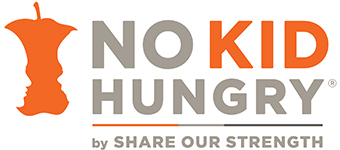When you support Share Our Strength and the No Kid Hungry campaign, you ensure that our mission is carried out in the following key areas:
School Meals
You help provide schools with the healthy food children need for every meal of the day.
In the United States today, millions of kids start the school day on an empty stomach. It’s hard for them to focus and learn. Luckily, there is a solution.
Schools across the country have started making breakfast part of the school day, just like lunch. That means a lot more kids get to eat and start the school day ready to learn.
Watch how supporters like you, help parents like Natasha, care for their kids and build brighter futures by receiving healthy meals at schoolthrough the No Kids Hungry campaign.
Grants
You enable us to distribute grants to schools, food banks and community groups across the nation to help them get what they need to feed kids.
A big part of what we do at No Kid Hungry is providing grants to schools and community groups across the country so they can afford what they need to feed kids.
No Kid Hungry grants are rarely used to buy food. The actual food served by public schools and community programs is paid for, partly, through the fees paid by students and by the federal government, which reimburses schools for the costs of the meals they serve.
But running a successful meals program requires more than food. School cafeterias and community centers need equipment like refrigerators and coolers. If a school serves breakfast in the classroom, they need carts and cooler bags to deliver the meals. During the coronavirus pandemic, tens of thousands of school meals programs suddenly needed all kinds of equipment, from delivery trucks to protective gear for workers to packaging for delivery meals.
See the amazing work that Team No Kid Hungry – volunteers, supporters, parents, teachers and community leaders – have accomplished together with your commitment to fulfilling our shared mission.
Advocacy
Your generosity helps us fight for policies that help families make ends meet through national, state and local elected leaders.
Modernizing the Summer Meals program is one of these policies that you make possible.
Summer can be a time of hunger for kids, especially those who rely on free meals at school, as many schools are closed in the summer. To meet that need, No Kid Hungry helps communities operate meals programs to feed kids, programs that operate through schools, parks, public libraries and more.
Your impact is allowing kids to eat free, healthy meals at summer meals sites this year. These programs are a lifeline for low-incomes families as they struggle under the added cost of feeding kids during the summer. Most families rely on their kids eating free school meals, and must scrape together as much as $1000 more each summer to pay for the added cost of food. See how summer meals programs help hardworking families and lift up communities.
Awareness
Because of your support, we are able to work with celebrities, chefs, news media and major companies to ensure the crisis of childhood hunger in the United States is acknowledged and addressed.
Many people aren’t fully aware of the severity of the childhood hunger crisis in the United States. With that, many parents are searching to find resources available in their community to help them feed their children.
Part of No Kid Hungry is helping people understand how prevalent childhood hunger is – and know where they can get help. We work with media partners like iHeartRadio to share information about free summer meals sites; Clear Channel Outdoor to spread awareness of community meals programs; Univision to reach families in Latino communities; and local media like PIX11-TV in New York City which helps people understand how hunger affects their community.
No matter where you live, there are children in your community who are hungry. Right now, those children need someone they can count on.
That someone is you.
Jeff Bridges, No Kid Hungry’s national spokesperson, shares a brief, powerful message about the lives of children in need, and the simple way that anyone can help.
Research & Policy
No Kid Hungry provides experts, research, tools and training to help people across the country feed children because of you.
One of the most effective ways to feed more children is by increasing participation in federal nutrition programs. Through federal guidance, state legislation and local policy changes, elected officials and other champions have improved and expanded these programs significantly.
Successful efforts have been made in states and school districts across the country that show the impact of laws and policies by changing the way schools serve breakfast. These changes ensure that all children start the day with a healthy meal that prepares them for learning.
The idea that only poor kids eat school breakfast keeps many hungry children out of the cafeteria. They don’t want to feel singled out. Watch this story about a school community coming together to make sure no kid feels the sting of a label.

Early Childhood
You help us directly impact struggling parents and caregivers of young children with healthy food for a strong start in life.
Though schools and community programs are an effective way to reach older children, to help the youngest kids, we need to help their parents and caregivers. No Kid Hungry is exploring ways to better reach very young children through programs at doctors’ offices and local child care centers, as well as efforts to strengthen federal programs like WIC and SNAP.
Read more
Good nutrition is especially crucial during early childhood, when a child’s brain and body are undergoing rapid growth and development. No Kid Hungry is focused on making sure that children get more of the healthy food they need during this important time. As part of this work, we partnered with the RAPID survey project team to collect essential information from families with young children and child care providers that can inform and guide our strategies.
According to the RAPID survey’s latest findings, titled Households with Young Children and Child Care Providers are Still Facing Hunger, approximately 1 in 4 families with young children experienced hunger in February, 2022.
It is hard to appreciate how devastating this reality is for those parents and caregivers who must face unthinkable tradeoffs at a time when they are already exhausted and overwhelmed caring for young children. What stress does this cause in a family? How can parents and other caregivers comfort a child who is hungry?
The RAPID findings revealed that “92% of child care providers reported that the food their center or program provides is “important” or “very important” and kids would go hungry without it.” Additionally, more than 1 in 4 of child care providers reported being concerned about the children they care for experiencing food insufficiency at home in April 2022. While the benefits of early child care programs are well documented, what is less discussed is the critical role child care plays in ensuring that millions of young children have enough nutritious food to eat every day.
Another startling finding from the RAPID report: one in three child care providers reported experiencing hunger themselves (February 2022). The very people who are charged with taking care of our food insecure children are themselves struggling with food insecurity. How can someone who is also worried about how to stretch their dollars to feed their family be expected to address their young students’ hunger without adequate support and funding?
A home-based provider in Kansas described their experience to the RAPID team, “I need to raise my rates to be able to afford to pay my bills and buy food for my family, but my daycare families can barely afford to pay me.”
Here’s why this is so important. Food insecurity, particularly during these early years, can have detrimental effects on cognitive, physical, and social/emotional development. “Every child deserves the opportunity to thrive – but millions of young children don’t get this opportunity. Their families need support and children need nurturing and nourishment for their bodies and brains to grow. The first 1,000 days are a window of opportunity to break this cycle, build more equal beginnings and put all children on track to flourish. What we do – or don’t do – now to build every child’s potential will determine their future—and ours,” said Blythe Thomas, Director, 1,000 Days of FHI Solutions.
Fortunately, there are concrete steps we can take to ensure more young children get the food they need. Programs like WIC and SNAP help meet the nutritional needs of infants, young children, and new mothers. But these programs need to be strengthened to reach more of the families who need them. Some important policy priorities include increasing SNAP benefits to ensure they more accurately reflect the cost of a nutritious diet; extending program certifications periods for WIC; and expanding access to online shopping and delivery. Our youngest children are truly our future. In the coming months, we will be working with allies and elected leaders to urge action to strengthen these essential programs.
“We’re just trying anything we can do to help feed these kids. It is worth it when you see the kids’ smiles or the relief on the parents’ faces.”
—Christine Clarahan, a school nutrition director in Indiana
Become a No Kid Hungry Insider
Do you want to receive exclusive email updates directly from No Kid Hungry?
Get direct and instant access to a member of our team, who will share information about your impact, project outcomes and stories from the field.
